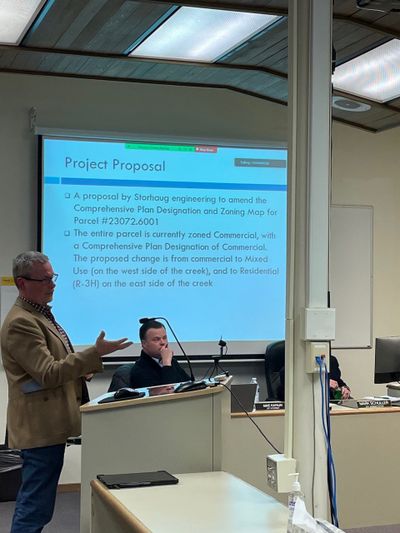Cheney council wants relocation strategies for mobile home park residents if development forces them out

North Cheney Mobile Home Park residents worry a proposal to rezone the park property is the first step in redeveloping the land, and the Cheney City Council appeared to take those concerns to heart at Tuesday night’s meeting.
The council requested the property owner provide relocation strategies for park residents and a timeline for when they would need to move if forced out, then deferred the agenda item for the rezoning to the next meeting.
“No matter what we do, we still have the issue of displacement, and how do we deal with that not only in Cheney, but in other locales as well?” Councilman Paul Schmidt said.
The 17-acre piece of land off State Route 904 between Bi-Mart and Grocery Outlet is in the commercial zone and split by Minnie Creek. The owner of the park, Bellevue attorney Todd Tarbert, wants to rezone the west side of the creek, where the park is located, to mixed use and the east side to multifamily residential.
Cheney Public Works Director Todd Ableman said the site was brought into the city in 1956 and initially developed as mobile homes. The property was zoned commercial in 1966.
Ableman said the city believes the commercial zoning was applied to facilitate commercial development. The Cheney Planning Commission on Feb. 13 unanimously recommended rezoning the property .
Clifton Trimble of Storhaug Engineering, the applicant for the rezone proposal, said there are no specific development proposals but the mixed-use side of the property could include commercial spaces on the bottom of a building and residential spaces above.
A “variety of housing” options, like one- to four-unit apartment buildings and townhomes, would be possible in the residential zone.
Nearly every seat was filled in Cheney’s council chambers Tuesday night, with about 35 people in attendance.
Douglas Brunell, a retired 73-year-old park resident, told the council the park is “a low-income area that people need.” He said other area mobile home parks are full, and he would not be able to move his home if development of the property forced him and other residents out.
“It’s a death sentence to close the park and make me a homeless person,” Brunell said.
Brett Bailey, another park resident, also worried about where he would go if the park closed. He asked the council to help residents if the park did close.
“It becomes a financial, logistical, mental, emotional disaster,” he said.
Alfredo Camarena Ramirez said he and his family lived at the park for 21 years. It would not be viable for any resident to relocate their mobile home because of the price. He said the Spokane homelessness issue would only worsen if residents had to move.
“It’s honestly quite ridiculous, and something needs to be done about it,” Camarena Ramirez said.
Alex Durkin, also of Storhaug Engineering, said he appreciated the concerns of park residents, but stressed the council was only considering the zoning designation of the land.
“It has nothing to do with the existing use of the property except that approving the action tonight brings the zoning designation into closer alignment with the current use,” Durkin said.
He said there was no timeline for development, and that the owner told Durkin the mobile home park could, in the end, remain in place.
Like Schmidt, Councilman Vincent Barthels said he would like to see a resident relocation plan from the engineering firm. While development plans have not been submitted, Barthels argued rezoning the property from commercial to mixed use would make the park a lot easier to develop.
“I don’t know that your client would have come forward with this application without some plan in the future, and we have to take care of this population,” Barthels said.
Durkin reasserted that the proposed rezoning “doesn’t have any potential to cause relocation.”
“There’s no potential for any disruption to the current use caused by this action because this is just zoning,” he said.
Durkin said the ideal time to discuss relocation strategies is if development plans are submitted.
“It’s difficult for us to imagine now how to strategize about relocation before any potential relocation is even on the table,” he said.